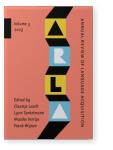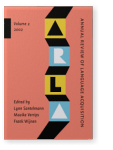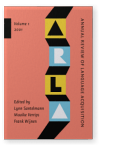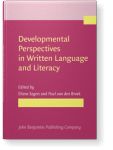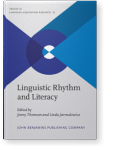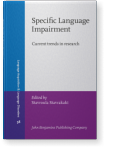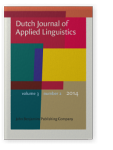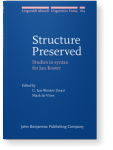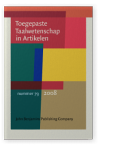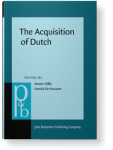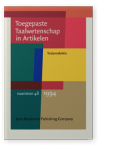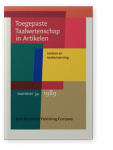Frank Wijnen
List of John Benjamins publications for which Frank Wijnen plays a role.
Yearbook
Titles
Annual Review of Language Acquisition: Volume 3 (2003)
Edited by Lynn Santelmann, Maaike Verrips, Frank Wijnen and Clara Levelt
[Annual Review of Language Acquisition, 3] 2003. vi, 180 pp.
Subjects Applied linguistics | Language acquisition | Multilingualism
Annual Review of Language Acquisition: Volume 2 (2002)
Edited by Lynn Santelmann, Maaike Verrips and Frank Wijnen
[Annual Review of Language Acquisition, 2] 2002. iv, 202 pp.
Subjects Language acquisition
Annual Review of Language Acquisition: Volume 1 (2001)
Edited by Lynn Santelmann, Maaike Verrips and Frank Wijnen
[Annual Review of Language Acquisition, 1] 2001. 197 pp.
Subjects Language acquisition
Articles
2017 Can poor readers be good learners? Non-adjacent dependency learning in adults with dyslexia Developmental Perspectives in Written Language and Literacy: In honor of Ludo Verhoeven, Segers, Eliane and Paul van den Broek (eds.), pp. 315–331 | Chapter
This study aimed to test whether adults with dyslexia are impaired at non-adjacent dependency learning, and whether potential learning difficulties are domain-specific or not. Participants were familiarised with one of two artificial languages containing dependencies between the first and third… read more
2016 Chapter 7. Word Stress Competence and Literacy in Dutch Children with a Family Risk of Dyslexia and Children with Dyslexia Linguistic Rhythm and Literacy, Thomson, Jenny and Linda Jarmulowicz (eds.), pp. 135–162 | Article
This study assessed Dutch word stress acquisition in children with (a familial risk of) dyslexia and normally developing children. Word stress production was measured through repetition of non-words with stress patterns varying in regularity. Both three-year-old children with a family risk of… read more
2015 Comparing SLI and dyslexia: developmental language profiles and reading outcomes Specific Language Impairment: Current trends in research, Stavrakaki, Stavroula (ed.), pp. 89–112 | Article
In light of the striking overlap in symptoms, it has been proposed that SLI and
dyslexia reflect the same underlying disorder, differing only in severity. An
alternative view is that SLI and dyslexia overlap (only) partially, sharing some
risk factors, and differing on various others. We will… read more
2014 Data curation for a VALID Archive of Dutch Language Impairment Data Dutch Journal of Applied Linguistics 3:2, pp. 127–136 | Article
The VALID Data Archive is an open multimedia data archive in which data from children and adults with language and/or communication problems are brought together. A pilot project, funded by CLARIN-NL, was carried out in which five existing data sets were curated. This pilot enabled us to build up… read more
2010 Syntactic predictions in second-language sentence processing Structure Preserved: Studies in syntax for Jan Koster, Zwart, C. Jan-Wouter and Mark de Vries (eds.), pp. 207–214 | Article
2008 Nederlandse Baby's Gebruiken Statistische Informatie om Spraakklanken te Leren Onderscheiden Toegepaste Taalwetenschap in Artikelen 79, pp. 21–29 | Article
Phonemes are perceived categorically and this perception is language-specific for adult listeners. Infants initially are "universal" listeners, capable of discriminating both native and non-native speech contrasts. This ability disappears in the first year of life. Maye et al. (Cognition (2002))… read more
1998 The acquisition of Dutch syntax The Acquisition of Dutch, Gillis, Steven and Annick De Houwer (eds.), pp. 223 ff. | Article
1994 Taalproduktie en -Ontwikkeling Taalproduktie, pp. 39–46 | Article
The question that is addressed in this contribution is: to what extent does the language production mechanism in children differ from that in competent adult speakers? It is assumed that utterance planning in adults is a hierarchical process, in which relatively autonomous processing components… read more
1989 Kennis, Vaardigheid en 'Performance' in de Taal/Spraak-Ontwikkeling: Differentiatie Van Inhoudswoorden en Functie-Woorden Lexicon en taalverwerving, pp. 98–106 | Article
Chomsky's notions of 'knowledge' and 'ability' are discussed, and are distinguished from the notion 'performance'. 'Knowledge' is taken to refer to the native speaker's abstract knowledge of the language system, 'ability' is taken to refer to the (no less abstract) processing mechanisms underlying… read more
1989 Woordvormanalyse Door Kinderen: De Rol Van Klemtoon en Vormovereenkomst Lexicon en taalverwerving, pp. 88–97 | Article
Early word form representations are assumed to be unanalyzed 'routines'. Around age 2 1/2, when the first 50 to 100 words have been acquired, the organization of the mental lexicon starts to change. Word form representations are segmented into their constituent linguistic substructures: syllable… read more
